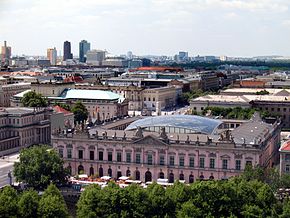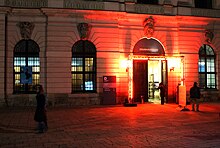Zeughauskino
The Zeughauskino is a non-commercial cinema in Berlin . It is part of the German Historical Museum and is housed in the armory ( Unter den Linden 2, entrance on the Spree side ). Alongside the Arsenal, it is the most important art house cinema in Berlin.
history
As early as 1958, the Museum of German History had set up a room for cinema screenings in the premises of today's Zeughauskino, which was only used sporadically between 1958 and 1992. On February 1, 1992, the cinema - now as part of the German Historical Museum - began regular operations under the then director Rainer Rother . During the renovation of the armory from 1998 to 2003, film screenings were held in the cinema hall of the Martin-Gropius-Bau . The director of the Zeughauskinos has been Rothers Jörg Frieß's successor since 2006.
Cinema hall and technical equipment
The cinema hall cannot be reached via the main entrance of the German Historical Museum, but via a side entrance on the Spree side of the armory and, since a renovation in 2004, offers space for 164 viewers. The Zeughauskino has both analog ( 35mm , 16mm ) and digital (including DCI 4K) projection technology.
Program focus
As a classic repertoire cinema, the Zeughauskino focuses its program selection on the presentation of historical films. The film series deal with individual filmmakers as well as with historical or thematic contexts. Some of these series are based on the special exhibitions of the German Historical Museum.
The Zeughauskino deals particularly intensively with the history of German film and the history of documentary cinema , to which, among other things, the regular series “Berlin.Dokument” is dedicated.
In addition, the cinema also presents film programs that deal with aspects of contemporary cinema that cannot be found in the program of commercially operating cinemas.
Numerous film screenings are accompanied by introductory lectures by film scholars, historians or journalists.
At the Berlinale, the Zeughauskino will primarily show films from the "Retrospective" and "Homage" sections.
See also
literature
Michael Wedel: Show, collect, preserve. About the Zeughauskino, Fritz Lang and the indivisibility of film history. In: Filmblatt , Vol. 17, No. 50 Winter 2012/13, pp. 75–82.
Web links
- Website of the cinema with the current program and program archive
Coordinates: 52 ° 31 '5 " N , 13 ° 23' 52" E


